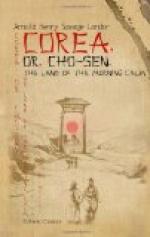Having taken a sketch or two, I retraced my steps and again reached the entrance. The instant I was outside, the gate was again shut and nailed up, wooden bars being put right across it. I was then led to the inner enclosure. The gate of this was guarded by about a dozen armed men, I being now in front of the part of the house which was inhabited by the King himself. After all, however, his abode is no better than the houses of the noblemen all over Seoul. It is as simple as possible in all its details; in fact, it is studiously made so. There are no articles of value in the rooms, except a few screens painted by native artists; nor are there any signs marking it out in particular as the abode of a Sovereign. The houses of the high court dignitaries are infinitely more gaudy than the royal palace, for they are decorated externally in bright red and green colours.
The morning was spent in prowling about the grounds and in sketching here and there. In front of the King’s house, protected at a short distance by a low wall, is a second pond, in the middle of which, on a small island, the King has erected a summer pavilion of octagonal shape, in which during the warmer months he enjoys the reviving coolness of the still nights confabulating on State affairs with his Ministers and advisers (not foreign advisers), a pretty semi-circular, white wooden bridge joining, so to speak, the island to the mainland; but, besides this and the buildings provided for the accommodation of the Chinese envoys, when they come, I do not think there is anything in the royal enclosure worthy of special notice.
[Illustration: THE SUMMER PAVILION]
Near the main entrance of the palace is a small house for the accommodation of foreign Ministers, consuls and Chinese customs officials, when, on New Year’s Day and other public occasions, they are received in audience by the King. The small room is actually provided with a stove, as several unfortunate ambassadors have been known to have caught dreadful colds through having to remain exposed to the natural temperature for hours until it was the King’s pleasure to have them admitted to his presence. Indeed, I believe I am right when I state that one or two of these notabilities died in consequence of their experiences in this way. At all events, during my stay at Seoul, the Japanese Minister came by his death through a cold which he contracted by having to stand an inordinate time in the cold room, in his evening dress, and then walk minus his overcoat or wrappers, through the interminable paved passage leading to the audience-hall.




